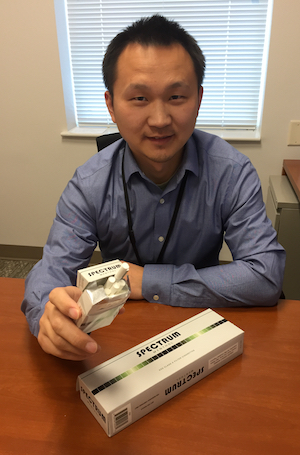That’s right, cigarettes. We’re replacing people’s cigarettes with … more cigarettes. But there’s a good reason.
As I told you about earlier, Aaron Yao, PhD, of our Department of Public Health Sciences and the UVA Cancer Center, is on a crusade against cancer in Appalachia. Smoking rates there remain terribly high — up to 30 percent of people smoke. It’s relatively rare for me to see someone smoking in the streets of Charlottesville, and I’m sometimes caught off guard when I return to my hometown in Southwestern Virginia and see so many people smoking.
In his latest effort to combat the problem, Yao has launched a new study to see if reduced-nicotine cigarettes can reduce withdrawal symptoms associated with with reducing nicotine dependence. He’s teamed up with Steven K. Malin, PhD, assistant professor of kinesiology at UVA’s Curry School of Education, for the new study, which is providing cigarettes at no cost to female smokers of working age in Charlottesville, Danville and Wise County, in Southwestern Virginia. One group of participants will get full-nicotine cigarettes, while two other groups will get reduced-nicotine cigarettes. Of the latter two, one of the groups will exercise and one will not. The thought is that the exercise will make participants feel better and may help prevent weight gain that sometimes occurs when people try to cut down on nicotine.
This isn’t a quitting trial. Participants aren’t asked to try to reduce the amount they smoke, because the researchers want to see if the people given reduced-nicotine cigarettes will end up smoking more. That wouldn’t be good.
I had a reporter ask Dr. Yao an interesting question: Is he morally conflicted about supporting people’s smoking habits during the trial? He was very clear: If someone decides she wants to quit smoking during the trial, he will fully support her leaving the trial. But for those who don’t intend to quit, perhaps their participation (and continued smoking) will benefit others in the future. Let’s hope so.
